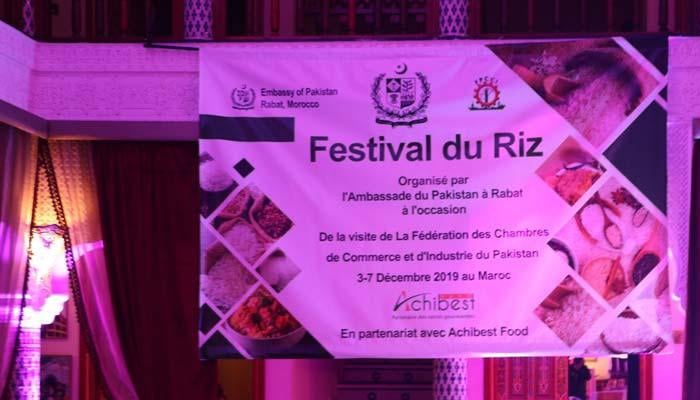With tantalizing aroma and taste, Pakistani Biryani hits Morocco big style
Ishtiaq Baig, Honorary Consul General of Morocco and Chairman Pak Morocco Joint Business Council, headed a delegation of 25 leading businessmen from Karachi to grace the event.
RABAT: Pakistan Embassy in the Kingdom of Morocco organised a Biryani festival in Rabat in order to promote Pakistani rice, spices and the soft image of the country as a tourist destination.
The event was organised in in collaboration with Pakistan Morocco Joint Business Council (PMJBC). Pakistan’s Ambassador Hamid Asghar Khan hosted the festival and welcomed dignitaries and businessmen from both the countries at the glittering event.
Ishtiaq Baig, Honorary Consul General of Morocco and Chairman Pak Morocco Joint Business Council, headed a delegation of 25 leading businessmen from Karachi to grace the event.
The Vice Chairman of Moroccan Parliament, members of the National Assembly, Chamber Presidents and local notables were among the 300 guests. Famous Pakistani chef Gulzar Hussain was brought from Karachi with his team especially for the occasion to cook Biryani for the guests. Four trademark varieties of the specialty, including prawn biryani, mutton biryani, vegetable biryani and chicken biryani, were served and highly appreciated by the guests. The festival area was filled with the aroma of delicious Pakistani Basmati rice. Pakistani music was another attraction that added to the festive mood of the environment.
Hamid Asghar Khan and his wife Ayesha Hamid welcomed the guests at the imposing and fully decorated venue. Several stalls were set up to showcase Pakistani rice. A number of rice buyers, restaurant and hotel operators were among the guests.
The well-attended festival was the first event after the launch of 'Engage Africa Policy' announced by the Prime Minister at a conference in Islamabad last week.
The ambassador explained that the event was a perfect example of the government facilitating the private sector and engaging proactively in trade diplomacy as per the government vision and directions of the foreign minister. He explained that “Moroccans are not traditionally a rice-eating nation but there is a growing interest in rice. Several Asian restaurants have recently opened up."
“Pakistan needs to swiftly turn to Africa and tap the African regional markets. This festival is part of PM’s vision of promoting trade and exports. Countries like Morocco offer huge opportunities of access to the common African market of 1.3 billion people, with the right kind of approach sky is the limit in these countries,” he added.
The Biryani festival was the brainchild of Mirza Ishtiaq Baig who put in a lot of effort in organising it and arranging the logistics. He said that Biryani is now popular in India and Pakistan regions but Mughals and Arabs brought Biryani to the north and south of India, respectively and from there it branched out. He said that the historical perspective is important because there is a growing market of rice and Biryani has become the important component when it comes to the export of rice from Pakistan. He shared that in Pakistan more than 40 different types of Biryani are cooked and in Arab-African countries like Morocco the demand for it is growing due to expanding cultural and business ties.
Ishtiaq Baig said that the festival provided a great opportunity for the Karachi business delegates to meet businessmen from Morocco over the course of three days during which future business opportunities were explored. He said import of Pakistani rice and other products will help increase rice exports as well as other industries.
Ishtiaq Baig said that Morocco — which has a population of 35 million people — is an important market to expand into a gateway to Africa and the present govt is taking steps to reach out to the unexplored markets.
-
Security forces gun down 30 terrorists in multiple IBOs in KP: ISPR
-
MQM-P calls for new province in Sindh
-
US report validates Pakistan military edge over India: PM
-
Banned TTP poses serious threat to Pakistan security: UNSC panel
-
CM Afridi clarifies remarks on by-poll after ECP requests army deployment
-
Dubai sees 3.2m Pakistani passengers in 2025 as airport sets new milestone
-
Security forces kill 23 Indian proxy terrorists in KP's Kurram
-
Pakistan to construct island to boost oil exploration: report













